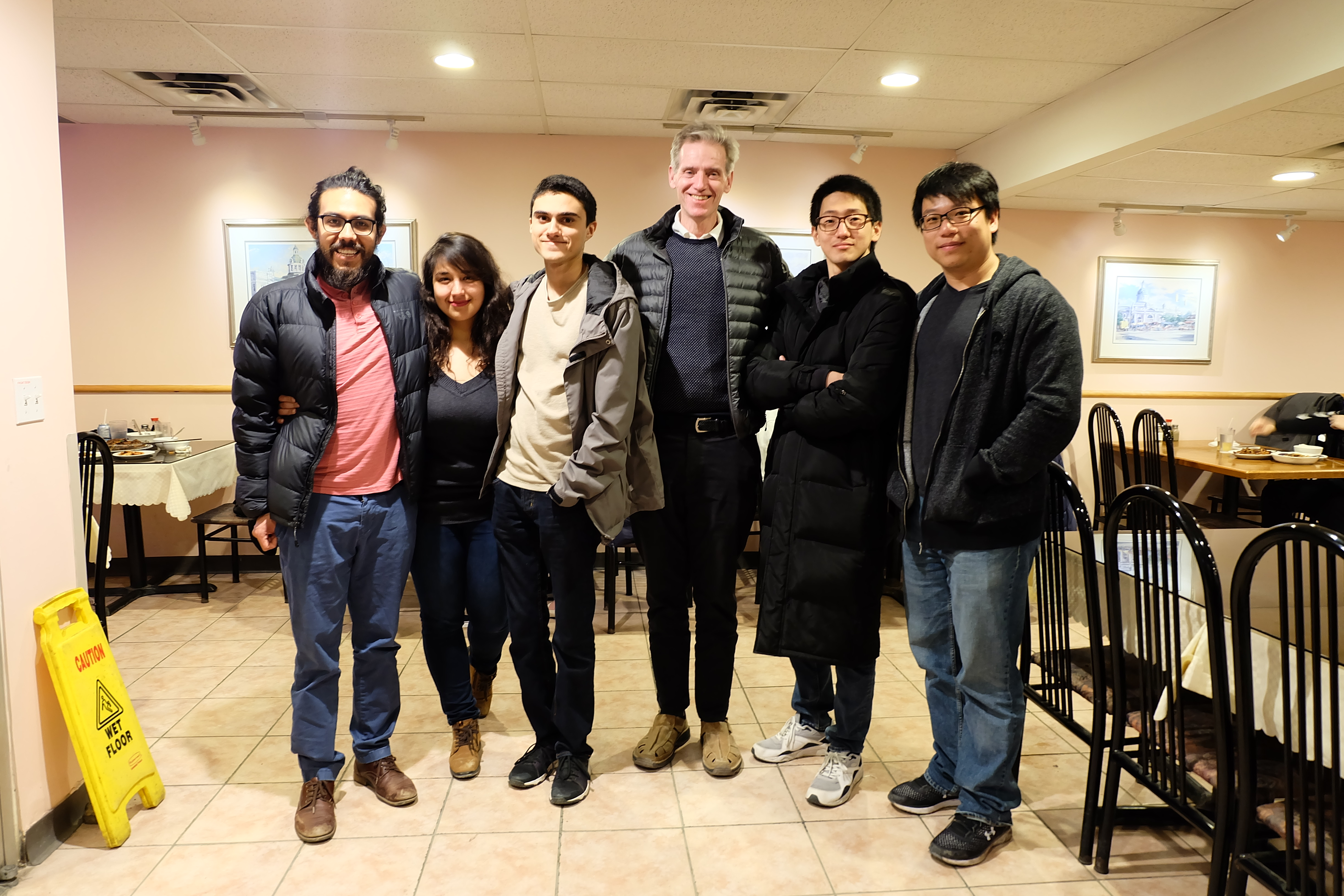
Thursday, May 30, 3:30 - 5:00, Jeff 115
Daniel Muñoz George (Queen's)
Graph Sums
In this talk we are interested in finding an optimal
upper bound for sums of product of matrices entries
with some restrictions. These kinds of sums appear
canonically in many problems such as the trace of the
product of matrices. In order to find this upper bound
we will associate a graph to every sum. This translate
the problem to finding an upper bound to some operator
associated to a graph. We will use some traffic and
functional analysis techniques to solve our problem.
Wednesday, May 8, 3:30 - 5:00, Jeff 319
Capacities of quantum channels and $SU(2)$-covariant channels
Classical/quantum capacity of quantum channels will be
discussed in the first half. Then I will introduce a
class of channels that can preserve SU(2)-symmetries.
Tuesday, May 7, 3:30 - 5:00, Jeff 319
Operator-Valued Infinitesimal Free Additive Convolution 2
We covered the most of the background knowledge that we
need to construct the operator-valued infinitesimal
free convolution (OVIC ) last talk. In this talk, we
will define the C^*-operator-valued infinitesimal
probability spaces and start to construct the OVIC.
Wednesday, May 1, 3:30 - 5:00, Jeff 319
Minimum output entropy and capacities of quantum channels
In this talk, minimum output entropy (MOE) and
Holevo/quantum capacity of quantum channels will be
discussed. And I will sketch how the additivity
conjecture of MOE was disproved by random unitary
channels.
Monday, April 29, 3:30 - 5:00, Jeff 234
Operator-Valued Infinitesimal Free Additive Convolution 1
In this talk, we will recall some basic knowledge of
operator-valued probability spaces, and some analytical
properties of the operator-valued Cauchy
transforms. Then, we will introduce the
C^*-operator-valued infinitesimal probability spaces,
and the operator-valued infinitesimal Cauchy
transform. We will also construct the operator-valued
infinitesimal R-transform if time permits.
Wednesday, April 24, 3:30 - 5:00, Jeff 319
A mathematical introduction to quantum information theory
As a cornerstone for discussing quantum information
theory, I will explain what quantum states and quantum
channels are in this talk. And I will introduce some
important properites of quantum channels such as the
entanglement-breaking property and classical/quantum
capacity.
Monday, April 22, 3:30 - 5:00, Jeff 319
Infinitesimal Freeness and the Gaussian Orthogonal
Ensemble, II
I will continue from last week.
Monday, April 8, 3:30 - 5:00, Jeff 422
Operator-valued infinitesimal freeness
In this talk, we will introduce the operator-valued
infinitesimal probability space and we will give an
characterization of operator-valued infinitesimal
freeness.
March 4 - 29
Centre de Recherches Mathématiques (l'Université de Montréal)
In the month of March the seminar will move to
the Centre de Recherches Mathématiques at
l'Université de Montréal for a one month focus program.
Monday, February 25, 10:00 - 11:30, Jeff 319
Fully Matricial Functions, Part IV
I will discuss § 2.3 Difference-Differential Calculus
and § 2.4 Taylor-Taylor Expansion.
Monday, February 11, 10:00 - 11:30, Jeff 319
Fully Matricial Functions, Part III
I will continue the discussion of the difference-differential calculus.
Monday, February 4, 10:00 - 11:30, Jeff 319
Fully Matricial Functions, Part II
I will discuss the difference-differential calculus.
Monday, January 28, 10:00 - 11:30, Jeff 319
Fully Matricial Functions
When one extends the Cauchy transform to the operator
valued case one cannot recover the law of the random
variable without extending to the matricial case. This
requires one to develop the theory of fully matricial
functions. These are functions defined on open sets in
C*-algebras that extend to matrices of all orders in a
regular way. I will present the example of the Cauchy
transform and introduce fully matricial functions.
Monday, January 21, 10:00 - 11:30, Jeff 319
Tensor Products of Modules and Vector Spaces
This talk will review the construction of the tensor
product of modules and its universal property. This
property can be used to establish associativity,
commutativity over direct sums, and a check for
linear independence when our modules are vector
spaces. I also hope to give a brief introduction to
tensor norms.
Previous Schedules
Getting to Jeffery Hall from the Hotel Belvedere


